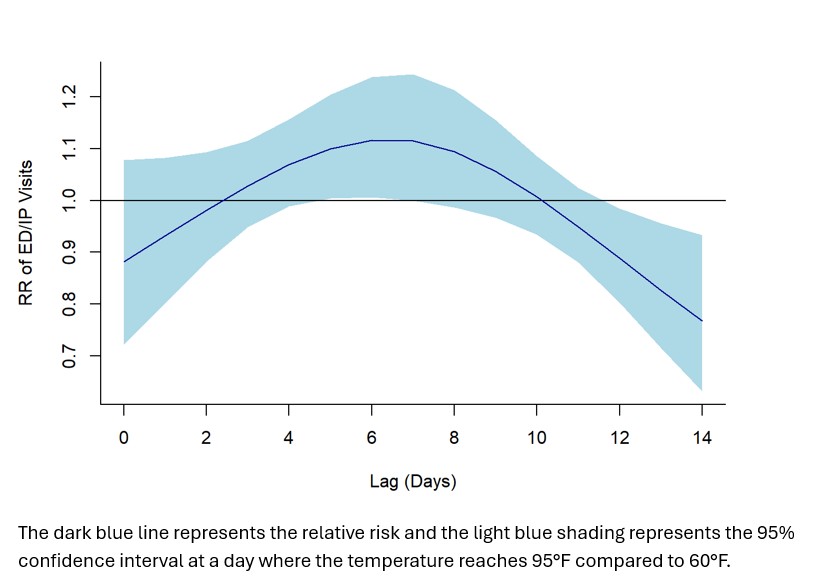Session Information
Session Type: Poster Session A
Session Time: 10:30AM-12:30PM
Background/Purpose: Temperature and air pollution are increasing each year across the US. There is growing interest in studying how the effects of high temperature impact patients with rheumatic conditions. We aimed to provide a framework using time series methods to assess whether specific days of high heat contributed to acute care utilization (emergency department [ED] and inpatient [IP] visits) among individuals with rheumatic conditions.
Methods: We identified patients with ≥ 2 ICD-10 codes for rheumatic conditions in a multi-hospital center in Massachusetts. We obtained temperature and relative humidity from the National Oceanic Atmospheric Administration and air quality data from the Environmental Protection Agency. Acute care use was defined as ED or IP visits with a primary diagnosis code for a rheumatic condition or heat related illness (e.g. heat stroke, dehydration) from January 1, 2022, to October 1, 2024.We used distributed lag non-linear time series models to estimate the effects of high temperature on risk of acute care utilization. These models allow for non-linear associations between exposures and outcomes and delayed effects using lags. We allowed the effect of temperature to be distributed over 14 days (lag days) with a cubic spline and fit a quasi-Poisson model adjusted for relative humidity, air quality index, day of week and time.
Results: 16,131 patients met inclusion criteria. 79% were white, 71% female, and the median age was 63. There was an average of 1.2 (SD 1.1) ED and IP visits with a primary diagnosis of rheumatic condition or heat related illness per day across all patients. Over the 3 summers in the study period there were 38 days that reached 90+ Fahrenheit (°F) and 12 days that reached 95+ °F. In the distributed lag non-linear models, we found significant associations between temperatures of 87°F to 99°F with increased risk of acute care utilization at lag days 5 and 6. Figure 1 shows the lag-response curve at 95°F which provides relative risks for each lag day. When the maximum temperature reaches 95°F on a given day, we see that there is no effect on utilization on that day or the next few days, but there is a trend toward higher risk of utilization on days 4-9 with statistical significance at days 5 and 6, which decreases around day 10. The relative risk of an ED or IP visit 6 days after the temperature reached 95°F was 1.12 (95% CI 1.01, 1.24) (Table 1) compared to a day when the temperature was 60 °F. Figure 2 shows a contour plot of the relative risks at all possible lag days and temperatures, with darker red indicating higher risk of acute care utilization.
Conclusion: In this population of patients with rheumatic conditions, we found a modest delayed effect of high temperature on increased risk of acute care use for heat related illness and rheumatic conditions. The geographic areas where these patients lived have milder summers than other parts of the US, which may have limited our ability to detect risks associated with persistently high heat. As temperatures rise further, modeling approaches such as distributed lag non-linear models will become increasingly important to assess climate-related health risks among individuals with rheumatic conditions.
 Figure 1. Relative risk of acute care utilization among individuals with rheumatic conditions at each lag day after the temperature reaches 95°F.
Figure 1. Relative risk of acute care utilization among individuals with rheumatic conditions at each lag day after the temperature reaches 95°F.
.jpg) Table 1. Relative Risk of acute care utilization among individuals with rheumatic conditions at different temperatures and lag days.
Table 1. Relative Risk of acute care utilization among individuals with rheumatic conditions at different temperatures and lag days.
.jpg) Figure 2. Contour plot with relative risk of temperature effects on acute care utilization among individuals with rheumatic conditions.
Figure 2. Contour plot with relative risk of temperature effects on acute care utilization among individuals with rheumatic conditions.
To cite this abstract in AMA style:
Santacroce L, Collins J, Valle A, Summit R, Dellaripa P, Feldman C. Heat Exposure and Acute Care Utilization among Individuals with Rheumatic Conditions: A Time Series Framework for Identifying Delayed Associations [abstract]. Arthritis Rheumatol. 2025; 77 (suppl 9). https://acrabstracts.org/abstract/heat-exposure-and-acute-care-utilization-among-individuals-with-rheumatic-conditions-a-time-series-framework-for-identifying-delayed-associations/. Accessed .« Back to ACR Convergence 2025
ACR Meeting Abstracts - https://acrabstracts.org/abstract/heat-exposure-and-acute-care-utilization-among-individuals-with-rheumatic-conditions-a-time-series-framework-for-identifying-delayed-associations/
